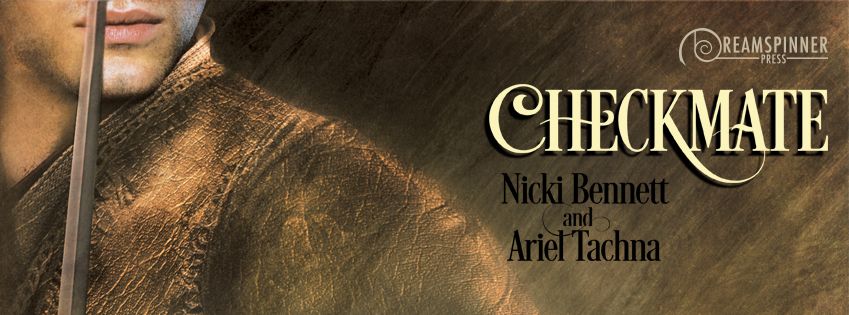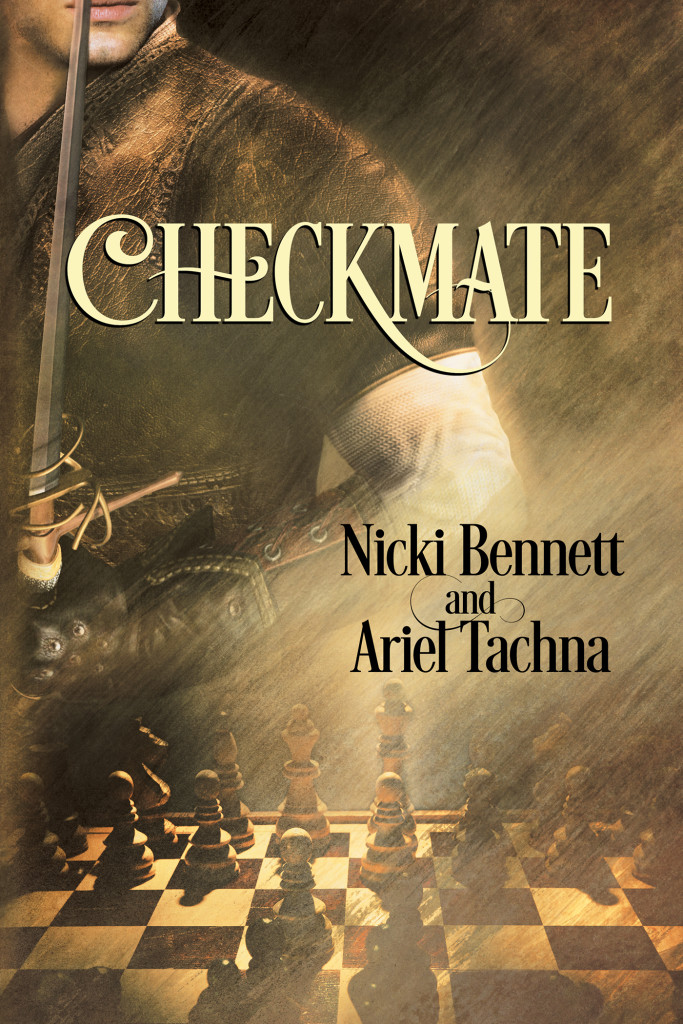A warm welcome to authors Nicki Bennett & Ariel Tachna joining us today to talk about their new release “Checkmate”.
They are talking about cursing share an excerpt and brought a giveaway with them!
Welcome Nicki & Ariel
Well, #@$%*!
(Warning: Adult language ahead)
Something we didn’t expect during edits on our All for Love series was that we’d run into problems with swearing. After all, our heroes are seventeenth-century mercenaries and musketeers, and surely even a nobleman like Christian would get frustrated enough to let rip with a choice curse on occasion.
As it turns out, the issue wasn’t that our men are swearing, but what they say.
We’d scattered some curse words throughout the novels—depending on the circumstances, ranging from shit and damn to a few well-placed fucks. To our surprised, many of these were flagged during editing as not being historically accurate. According to the Online Etymological Dictionary, a source we check regularly to determine whether words or phrases were in use during the period the novels are set in, swearing as we know it is a fairly modern development. For example, shit as a verb dates back to the fourteenth century, and as a noun in the sense of excrement from the 1580s. However, the dictionary is singularly unhelpful in specifying when it began to be used as an expletive.
Fuck is even harder to date, largely because as the dictionary mentions, it was considered such a vulgar word that it was often not written down. There’s disagreement on when the earliest written use can be found; dates range from 1503 to as early as 1310, though as the dictionary’s authors state, “Presumably it is a more ancient word, but one not written in the kind of texts that have survived from Old English and Middle English.” As an expletive, though, our editors dated the earliest recorded usage to 1927. How much of this was due to its being banned in printed material, whether by convention or actual law, until the twentieth century is obviously hard to determine.
The one expletive known to have been used as such as early as the fourteenth century is damn. But we felt it would be too repetitious if that was the only curse word all our characters use, especially when the situations that drive them to swearing range from mild annoyance to full-on outrage.
So we decided to look for period-authentic swear words we could use instead. We soon discovered that “historical” curses were often based on religious imagery. Phrases such as “by God’s blood” or “by Christ’s wounds”—often elided into exclamations like ’sblood or zounds!—may have been shocking in the 1600s, but we were afraid they’d elicit laughter in today’s readers.
We got around the issue in some cases letting the characters swear in their native language. Teodoro can exclaim maldita sea—“damn it”—or the musketeers can mutter merde or putain—“shit” and “fuck,” more or less, or if one is especially angry, putain de merde!
That doesn’t work for our English-speaking characters, though. And while we used damn where we could, there are some situations where anything other than a “Well, fuck” or “Fuck that!” just wasn’t forceful enough. So with some citations to back up our contention that people probably used expletives far earlier that the written record indicates, we politely asked our editors to leave some of them as written.
What do you think? When reading a historical romance, which would bother you more, having a character exclaim something like “Fuck” or “zounds”? We’ll pick one comment give away a free eBook from either of our backlists.
Blurb:
When sword-for-hire Teodoro Ciéza de Vivar accepts a commission to “rescue” Lord Christian Blackwood from unsuitable influences, he has no idea he’s landed himself in the middle of a plot to assassinate King Philip IV of Spain and blame the English ambassador for the deed. Nor does he expect the spoiled child he’s sent to retrieve to be a handsome, engaging young man.
As Teodoro and Christian face down enemies at every turn, they fall more and more in love, an emotion they can’t safely indulge with the threat of the Inquisition looming over them. It will take all their combined guile and influence to outmaneuver the powerful men who would see them separated… or even killed.
Christian stepped into the bedroom, shutting the door behind him and looking anywhere he could except at Ciéza. Even staring at the farthest corner of the room, he could see the other man in bed, his chest bare, the sheets covering his lower body so that Christian could not tell what he still wore. Then his eyes landed on the pile of clothing on the small stool: shirt and breeches. Damn! he cursed silently, struggling to get his own body under control so that he would not embarrass himself as he undressed. That brought him to another problem: undressing with Ciéza’s gaze on him. The man was not his lover, however much he might wish otherwise, and to strip down in his presence, beneath his watchful gaze, seemed too fraught. His gaze averted from Ciéza, Christian approached the bed, still fully clothed.
Lying on his back, Teodoro let his gaze rake over Blackwood’s body, wondering how much of his clothing he would remove before climbing into the bed. He could feel his cock thickening, and he shifted slightly under the bedsheet, watching from beneath hooded lids as Blackwood hesitated at the foot of the bed. “Are you going to stand there all night?” he growled, his voice rasping. Turning to his side, he blew out the bedside candle. The moonlight filtering through the latticed window provided enough illumination to reveal Blackwood’s unsettled expression. A pang of anger twisted in Teodoro’s chest at the thought that the vizconde could not even bear to share a bed with him. “Get into the bed and go to sleep,” he husked.
The lack of light and the absence of Ciéza’s gaze gave Christian the courage he needed to slip off his shirt and climb into bed. He lay there awkwardly, afraid to move lest he roll against Ciéza. He could smell the soap the other man had used, and the deeper musk of the man, the scent enough to have him shifting restlessly as his erection returned. He shivered with suppressed desire, certain he would stare at the ceiling all night.
Buy link:
Growing up in Chicago, Nicki Bennett spent every Saturday at the central library, losing herself in the world of books. A voracious reader, she eventually found it difficult to find enough of the kind of stories she liked to read and decided to start writing them herself.
Visit Nicki:
Facebook: www.facebook.com/profile.php?id=100011754789784
E-Mail: nickibennett1@gmail.com
When Ariel Tachna was twelve years old, she discovered two things: the French language and romance novels. Those two loves have defined her ever since. By the time she finished high school, she’d written four novels, none of which anyone would want to read now, featuring a young woman who was—you guessed it—bilingual. That girl was everything Ariel wanted to be at age twelve and wasn’t.
She now lives on the outskirts of Houston with her husband (who also speaks French), her kids (who understand French even when they’re too lazy to speak it back), and their two dogs (who steadfastly refuse to answer any French commands).
Visit Ariel:
Website: www.arieltachna.com
Facebook: www.facebook.com/ArielTachna
E-mail: arieltachna@gmail.com
Ariel & Nicki brought them them a giveaway for our reader.
They offer a free eBook of any title from either of their backlists to one reader who leaves a comment on the post.









I think it depends on the situation, though “zounds” probably would make me giggle. Reminds me of an old Roy Blount essay on the orgasm, where he noted that before the first appearance of the word, “people probably said ‘odds bodkins’ or ‘what was THAT?!'”
I don’t think either is weird. Although zounds sounds like such a fun word to say =)
I think I would go for accuracy. Using a word which was not used at the time is like when you watch an old peplum film and one of the Romans is wearing a watch… so historicity is good for historicals, even though zounds sounds weird (maybe a note explaining the origin of the word would be appreciated…)
I really wouldn’t mind either way because if I’m really caught up in the story line, I really don’t care if it would be historically correct because I probably wouldn’t know off the top of my head and I wouldn’t want to take the time from reading the book to investigate.
Thank you for your lovely books!
Thx for the education on swearing – who knew? Actually, I prefer whatever language used be close to that of the times, but I’m not a stickler, as long as it doesn’t take me out of the setting. I’ve already read Checkmate and loved it. Congrats on this release of it.
congrats Purple Reader!